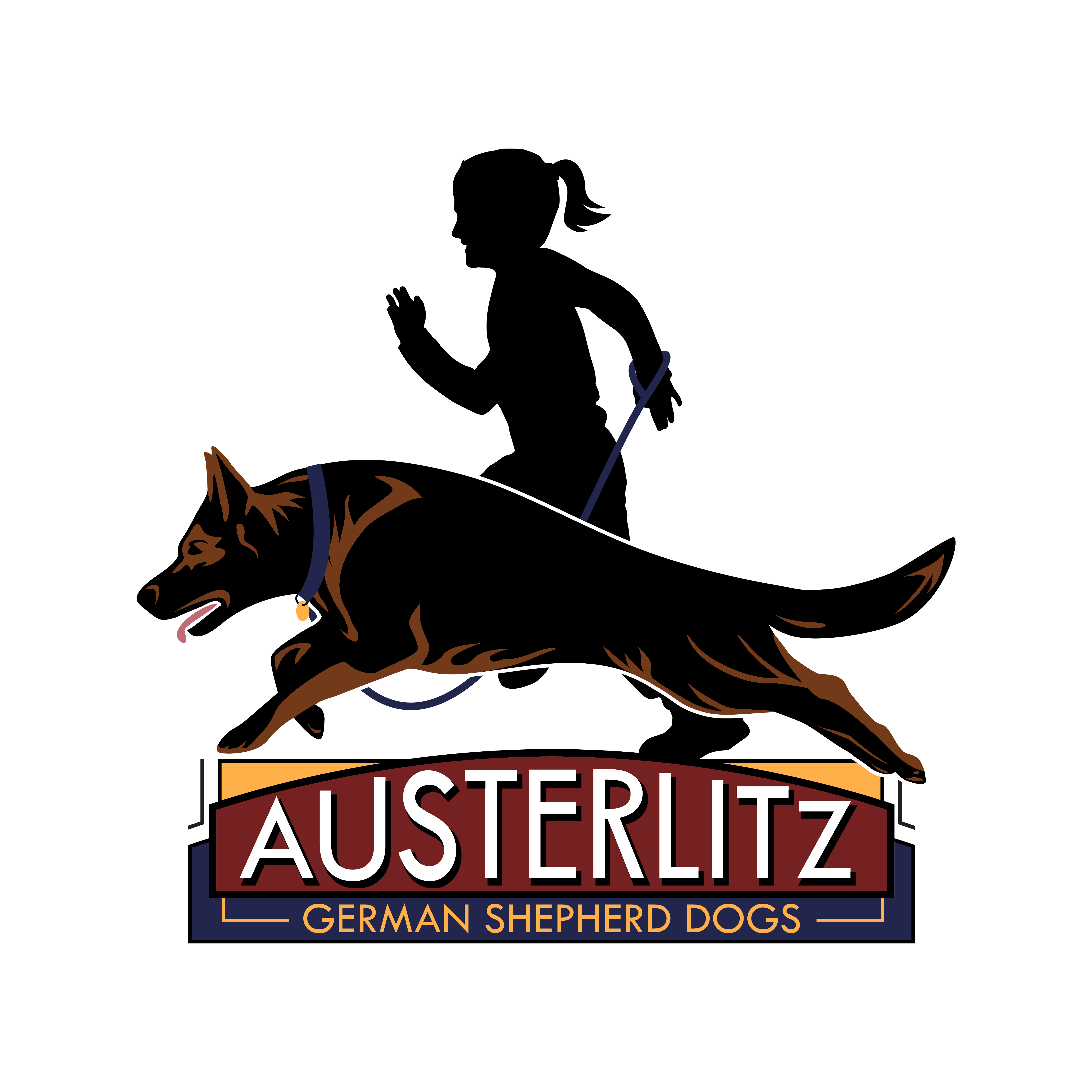Making the Golden Years the Greatest Years. 10 tips for caring for your senior dog.
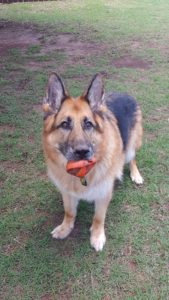
Throw us a bone? This blog may contain affiliate links, which means if you purchase a product from a link the seller pays us a few cents, but you never pay more.
This was one of our most popular notes on the Austerlitz German Shepherds FB page, so I’ve updated it and posted it here.
We have reached the point in our journey as breeders and owners of German Shepherd Dogs that we have now raised several generations of dogs from birth, through their lives, and finally to the end of their lives. We have learned so much from our dogs, including how to care for the special needs of senior dogs. We get lots of requests for information on how we care for our older dogs, from our clients with older dogs but also from people who get to meet our older dogs and see how healthy and active they are even at an advanced age.
10 Easy Senior Dog Care Tips
- Physical Condition. Thin is IT! Keeping your dog in a lean body condition is the single most protective thing you can do to ensure your dog lives the longest and healthiest life possible. Researchers have proven that lean dogs live longer, and develop age related illnesses such as arthritis and cancer later than their litter mates who are maintained in “Ideal” body condition. Keeping a dog lean for it’s entire life is best, but as senior dogs age it can be harder to keep them lean because they burn fewer calories. Your senior dog may need fewer calories and so less food as they age. Use this tool to determine your dogs body condition. Senior dogs should be maintained in an Ideal body condition, while younger dogs should be maintained in a lean body condition.
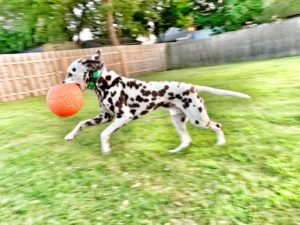
2. Targeted Nutrition. We generally do not use senior diets, instead we keep our seniors on either Pro Plan Sport 30/20 (if they are quite active) or Purina ONE Sensitive Systems (if tummy troubles occur, or they need fewer calories) but there are two specialized diets that are outstanding and worth considering.
Purina Bright Mind: This is the OTC version of Purina’s NeuroCare. BOTH products have been extensively tested and proved to benefit cognitive function in senior dogs. So dogs who seem mentally “dim” or “detached” from family activities, those who are Sundowning or are diagnosed with canine cognitive disfunction will all benefit. We have used Purina Bright Mind with outstanding results in our seniors.
Hills Healthy Mobility and Science Diet JD: If your senior dog has any type of joint disease or old injury (such as ACL strains, tears, or repairs) these two products are worth considering. Both have been extensively studied and proven to have therapeutic value, we have used both ourselves and seen nothing short of amazing results. Any senior dog who is experiencing stiffness can benefit.
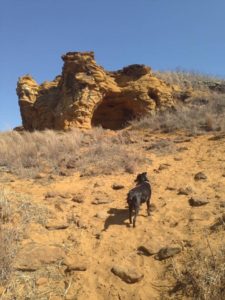
3. Exercise – Physical. Dogs of all ages need more exercise than we think. Senior dogs may not be able to participate in the same activities and at the same level of intensity they did when they were young but they still require plenty of exercise to keep them healthy and mobile. As your sport dog ages consider lower impact sports so your dog can continue to enjoy training and attending trials. Senior dogs can take walks, maybe shorter in duration and more often and by all means, let your senior dog sniff! If your vet approves even fetch and tug games are okay. The most important thing is regularity, old dogs can’t bounce back from “weekend warrior syndrome” like young dogs. Always make adjustments and visit with your dog’s vet if your dog is stiff or uncomfortable after exercise. Remember, by the time you notice discomfort your dog has likely been in pain for a while. Older dogs may not be able to play with rough younger dogs, but they can enjoy socializing with very polite dogs under proper supervision, so continue to cultivate dog friendships for your senior dog.
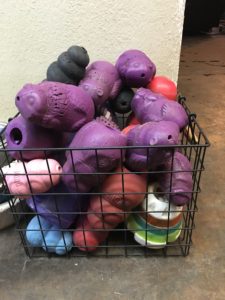
4. Exercise: Mental. Older dogs really need to stay mentally engaged in life in order to be happy. With their propensity to sleeping more it is easy to forget how important it is to keep older dogs mentally engaged. Dogs who continue learning new skills, solving puzzles, and visiting new environments have better mental health than older dogs who are allowed to spend too many hours laying around detached from their lives and people. While you might not be able to do all the high intensity sports and training you once did with your senior this is no reason to forget how much your friend enjoyed working with you! We find older dogs love playing the popular clicker game 100 Things To Do With A Box, targeting games (both foot and nose), Nose Games (such as tracking, and Scent Work) and Match to Type games (where dogs match items by type, fabric, shape, etc). You will find your dog will enjoy life so much more if you engage them in fun mental exercise games every day. This might be as simple as throwing that food bowl away and feeding your senior their kibble in a puzzle toy (we like Nina Ossmen, try rotating types for variety), treat mazes, kibble dispensers (we like Kibble Nibble), or even scattering it around the house or yard. Make a point of ensuring your senior dog has interesting experiences, and opportunities to learn new things every day.
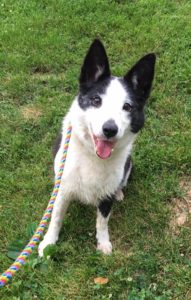
5. Targeted Supplementation. Older dogs can benefit from a well rounded joint supplement. Since dogs are living longer healthier lives than ever, protecting those joints is even more important since they have to last longer than they used to. We use and recommend three products backed by research and manufactured under high standards by trustworthy companies. For potent Omega 3 benefits the product Bayer Free Form is the best we have ever found. For potent all around joint support Bayer Synovi G4 (a palatable chewable) or VetriScience Glycoflex 3 (flavored tablet and chewable) are both excellent options. It’s always best to start supporting your dogs joint long before age related degradation starts, we generally recommend starting at age 6.
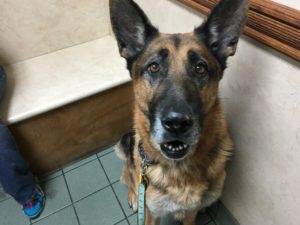
6. Regular Veterinary Care. Healthy older dogs really do need to visit their vet once, or even better, twice per year. A good vet will keep on top of age related illnesses before they are advanced, check your dogs teeth, joints, and heart for optimal function as well as do some blood work. Be sure to talk to your vet about canine cognitive disfunction if your senior dog’s behavior seems “off” and review this list of Q&A as talking points with your dog’s vet. Your vet is your dog’s front line of defense, so trust them, and don’t begrudge your senior the health screenings needed to detect illnesses early. After a lifetimes of taking care of you and your family, your dog has earned some special care!
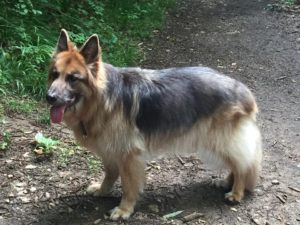
7. Regular Grooming. There is nothing as pitiful as seeing a senior dog with long nails and “old dog hair” sticking out everywhere! Senior Dog grooming is important! Regular brushing, nail trims, occasional baths, and proper diet will keep your senior looking like they should, soft and shiny! Good grooming keeps dogs comfortable, gives you a chance to check for lumps and bumps (do NOT forget to check for lumps in your dogs breast area every time you brush and for intact males the testicles as well!) sores, parasites, and other “stuff”. Older dogs may not wear their nails down as quickly as they once did, so trim or Dremel those nails regularly. Long nails put pressure on the joints of the foot, wrist, and shoulder which may aggravate arthritis and decrease your dogs mobility! Consider teaching your dog to use a scratch board to trim it’s own nails, this counts as both grooming and mental enrichment. If your senior has dry, course, rough hair that does not shed as needed consider adding Bayer Free Form to grow healthier coat.
8. Pain Management. If your senior dog does suffer from the aches and pains of old age, don’t force them to live with pain. There are many pain control options for dogs that you can discuss with your vet. Dogs who worked hard and lived active lives or participated in high intensity sports may have had a variety of injuries. They may have some Degenerative Joint Disease, or other problems that may affect their enjoyment of their senior years. Medications are not the only options for pain control however. Many dogs benefit greatly physical therapies from acupuncture, chiropractic care, and laser therapy. Remember, observe your dog for subtle signs of pain, because by the time we notice our dogs limping, having trouble getting up, or getting snarky about being touched they have likely been in pain for a long time. Be sure to talk to your vet often and to observe your dog for signs of pain or discomfort.

9. A soft bed, secure footing, and help with stairs. An older dog may need a supportive bed to sleep on. Older dogs may not be able to climb up on the bed or sofa any longer and need a bed on the floor. Look for a bed without sides if your dog is prone to tripping. High density foam work great for older dogs, make sure it is thick enough that the weight of your dog does not crush it. Older dogs may fall down or trip, so if you have stairs or steps your dog must negotiate to get in or out or around your house install grippy rugs, mats, runners, or ramps to help your senior get around without fear of falling down. Decreased range of motion, vision, or hearing may make these every day things a challenge for your senior so watch your dog for signs of hesitation or confusion, it may be that a few small adjustments are all that are needed! Older dog may not hear as well as they once did, please don’t assume your older dog is being stubborn, she may not hear your request! If your dogs hearing is suspect teach her visual cues such as a flashlight flash to come inside. Don’t forget to teach her a hand signal for “good girl” (she surely misses hearing it!).
10. Individual attention. The most important thing your older dog needs is your continued involvement in her life! She may not be as exciting as she was when younger, she may not be competing and you may even have a fun new young dog to train, but she still loves you just as much as she always did! As she nears the end of her time with you make extra special effort to provide her with the very best care you can afford, the most attention, all the patience you can muster, and some special care. Do your very best to make her final years the very best years!
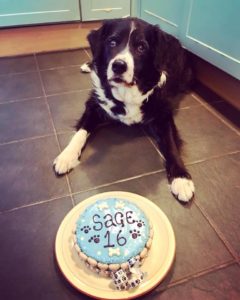
Here’s some affiliate links to some products mentioned in this blog!
